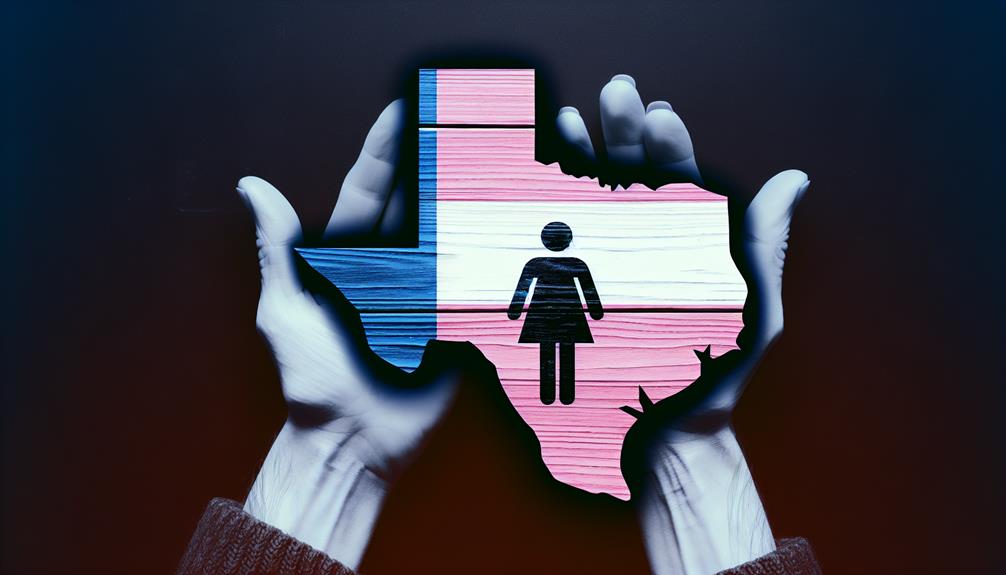
Unravel the complexities of Texas' transgender state of affairs and discover the far-reaching implications, leaving you eager for more.
Table of Contents
ToggleAmidst the turbulent winds of legislative debate, Texas finds itself at a crossroads regarding the rights and healthcare of its transgender community. With Senate Bill 14 causing ripples of controversy, the state is grappling with the delicate balance between protecting minors and respecting the medical needs of transgender youth.
As the dust settles, the implications of this bill on the transgender state of affairs in Texas are far-reaching, touching on issues of healthcare, workplace discrimination, education access, public accommodations, and legal developments.
The unfolding events in Texas beckon all to consider the complexities of this matter and the potential impact on the lives of transgender individuals, leaving much to be explored.
Key Takeaways
- Texas Senate Bill 14 poses a significant threat to the healthcare options of transgender youth, as it aims to ban therapies and transition-related surgeries for children with gender dysphoria.
- Workplace discrimination against transgender individuals is a pressing issue, with current state laws lacking specific protections against gender identity-based discrimination. This legislation impacts access to essential medical care for transgender individuals, highlighting the need for comprehensive legal protections and mental health support in the workplace.
- The education access of transgender youth is at risk due to SB 14, which prevents minors from accessing gender transition hormone and surgical interventions. Opponents of the bill argue that it could harm the health and educational experiences of transgender youth, emphasizing the ongoing challenges faced by this community in accessing education and healthcare.
- Texas lacks explicit public accommodations laws protecting individuals based on gender identity, leaving transgender individuals vulnerable to discrimination and denial of services in public spaces. Advocates stress the importance of establishing state-level protections and have garnered support from medical associations for gender-affirming care and equality in public accommodations.
Legislative Impact on Transgender Healthcare
The Texas Senate Bill 14, which aims to ban therapies and transition-related surgeries recommended for children with gender dysphoria, has sparked a heated debate about the impact on transgender healthcare. This legislative impact on transgender healthcare in the state of Texas has significant implications for trans youth. Medical treatment and access to healthcare for transgender adolescents are at the heart of this contentious issue. The bill's potential to restrict essential medical treatments for trans youth has ignited strong opinions on both sides. Advocates emphasize the importance of affirming healthcare treatments for trans youth, while opponents argue that the bill seeks to protect children from potentially harmful procedures.
The debate surrounding Senate Bill 14 highlights the complex intersection of healthcare, gender identity, and legislation. It raises critical questions about the rights of trans youth to receive appropriate medical care that aligns with their gender identity. The state's decision on this bill will undoubtedly have a lasting impact on the healthcare options available to transgender adolescents in Texas.
It's crucial to navigate this sensitive issue with empathy and understanding, ensuring that the well-being of trans youth remains a top priority in the ongoing discussions.
Workplace Discrimination and Transgender Rights
Amid ongoing debates and advocacy efforts, transgender individuals continue to face workplace discrimination that undermines their rights and well-being. The current state law in Texas has sparked concerns about the protection of transgender rights in the workplace.
The Texas Supreme Court's decision to support Senate Bill 14, which aims to ban therapies for kids with gender dysphoria and prohibit transition-related surgeries for minors, has led to increased anxieties among the transgender community regarding their access to medical care. This legislation directly impacts the ability of transgender individuals to receive hormone therapy and other necessary treatments, affecting their mental health and well-being.
Furthermore, the lack of specific protections against workplace discrimination based on gender identity has left many transgender individuals vulnerable to mistreatment and bias in employment. With the Texas Legislature's focus on limiting healthcare options for transgender individuals, there's a pressing need to address the intersecting issues of workplace discrimination and access to medical care.
Advocates emphasize the importance of comprehensive legal protections and mental health support for transgender individuals in the workplace to ensure their safety and well-being.
Education Access for Transgender Individuals
With the ongoing debates and advocacy efforts surrounding transgender rights in Texas, there is a need to address the accessibility of education for transgender individuals. The Texas Senate's recent passage of SB 14, banning certain medical interventions for transgender children, has sparked concerns about the impact on education access for transgender youth. The law prevents minors from accessing gender transition hormone and surgical interventions, potentially affecting their ability to receive necessary medical care and support within educational settings. Medical experts argue that affirming treatments for trans youth are crucial for their mental well-being, and national medical associations support these interventions. LGBTQ advocacy groups and Texas medical organizations have opposed SB 14, highlighting the potential harm it may cause to transgender youth's health and educational experiences. The ongoing legal battle around the law further underscores the complexities and challenges faced by transgender individuals in accessing education and essential healthcare in Texas. The table below summarizes key points related to this critical issue:
| Issue | Impact | Stakeholders |
|---|---|---|
| SB 14 Passage | Limits medical interventions for transgender minors | Texas Senate, LGBTQ advocacy groups, medical experts |
| Education Access | Potential impact on transgender youth's well-being | Transgender children and youth, educational institutions |
| Legal Battle | Ongoing fight for healthcare and educational rights | Texas Supreme Court, LGBTQ advocacy groups, families |
Public Accommodations and Transgender Inclusion
The recent legislation impacting medical interventions for transgender minors in Texas has brought attention to the need for comprehensive protections and inclusion of transgender individuals in public accommodations.
Currently, Texas doesn't have explicit public accommodations laws that protect individuals based on their gender identity, leaving transgender individuals vulnerable to discrimination and denial of services. This lack of clear legal protections can lead to instances of harassment and unequal treatment for transgender individuals in public spaces.
Advocates emphasize the importance of establishing state-level protections to ensure the safety and equal access to services for transgender individuals. Efforts are ongoing to push for policies that safeguard the rights of transgender individuals in public accommodations and create a more inclusive and welcoming environment for all.
The American Medical Association, Texas Medical Association, and Texas Pediatric Society have expressed support for gender-affirming care, including hormone therapy and hormone blockers for transgender youth. It's crucial to foster an environment of equality and respect for all individuals, regardless of their gender identity, in public accommodations.
Legal Developments Affecting Transgender Community
Legal challenges facing the transgender community in Texas are raising concerns about access to vital healthcare services for transgender youth. The recent Texas Senate Bill 14 has sparked controversy as it aims to ban therapies like puberty blockers and hormone therapy for minors with gender dysphoria, impacting the availability of gender-affirming care.
The bill also prohibits transition-related surgeries for minors, further limiting medical treatments for transgender youth. Medical experts and LGBTQ advocacy groups have opposed the bill, emphasizing the importance of affirming treatments for trans youth's health and wellbeing.
However, the Texas Supreme Court's decision to allow the law to take effect on September 1 has left many families and healthcare providers worried about the potential consequences of restricted access to essential medical care for transgender youth.
The legislative session's focus on these legal developments has brought attention to the state government's role in shaping the healthcare landscape for transgender youth in Texas. It underscores the ongoing need to support and advocate for the rights of transgender youth to access gender-affirming care.
Frequently Asked Questions
Did Texas Pass Sb14?
Yes, Texas passed SB14, which aims to ban certain therapies for kids with gender dysphoria and prohibit transition-related surgeries for minors. The bill passed the committee in a 7-3 voice vote, with additional Republican support, amid opposition from LGBTQ advocacy groups and medical associations.
The Texas Supreme Court's denial of an emergency request to block the law allowed it to take effect on September 1, sparking legal challenges and public opposition.
Is the Texas Bill to Ban Gender-Affirming Surgery?
Yes, the Texas bill aims to ban gender-affirming surgery for minors.
The bill passed the committee in a 7-3 voice vote, with additional Republican support.
Texas medical groups, like the Texas Pediatric Society and Texas Psychological Association, testified against the bill.
National medical associations, such as the American Medical Association and the American Psychiatric Association, support affirming treatments for trans youth.
Opponents stress the need to prioritize the well-being of trans youth and their families.
What Is the SB 14 Bill in Texas for Gender-Affirming Care?
The SB 14 bill in Texas aims to ban therapies and surgeries related to gender dysphoria for minors. Medical experts argue that such surgeries are rarely performed on children.
The bill has sparked significant opposition from LGBTQ advocacy groups and medical associations.
At least 10 of Texas' 31 state senators support the bill, which would also prohibit health care facilities offering targeted treatments from receiving public money.
It has triggered legal battles, with a temporary injunction currently under appeal.
What Is Texas Senate Bill 12?
Texas Senate Bill 12 proposes a ban on gender-affirming care for minors, including therapies and surgeries for those with gender dysphoria. The bill, supported by several state senators, aims to prevent healthcare facilities offering these treatments from receiving public funding.
Medical professionals argue that such measures could harm trans youth's mental well-being, while research indicates that access to affirming care reduces suicide ideation and attempts in this vulnerable population.
Conclusion
In conclusion, the Texas transgender state of affairs is a complex and ongoing issue, with Senate Bill 14 at the center of the debate. While the law has gone into effect, a lawsuit challenging it's set to go to trial in May.
The outcome of this trial will have a significant impact on the rights and well-being of trans youth and their families. It's a critical moment for the transgender community, and the results will be closely watched by many.
Profile Author / Editor / Publisher
- Dora Saparow
- Dora Kay Saparow came out in a conservative Nebraskan town where she faced both misunderstanding and acceptance during her transition. Seeking specialized support, she moved to a big city, where she could access the medical, legal, and social resources necessary for her journey. Now, twelve years later, Dora is fully transitioned, happily married, and well-integrated into society. Her story underscores the importance of time, resources, and community support, offering hope and encouragement to others pursuing their authentic selves.
Latest entries
 News and AdvocacyNovember 14, 2025Rainbow Victories: 2025’s Most Pro-LGBTQ+ States Revealed
News and AdvocacyNovember 14, 2025Rainbow Victories: 2025’s Most Pro-LGBTQ+ States Revealed News and AdvocacyNovember 14, 2025Transgender Sanctuary States: Protecting Rights, Providing Hope
News and AdvocacyNovember 14, 2025Transgender Sanctuary States: Protecting Rights, Providing Hope Featured PostsNovember 13, 2025When Restroom Policing Backfires: The Hotel That Went Too Far
Featured PostsNovember 13, 2025When Restroom Policing Backfires: The Hotel That Went Too Far Featured PostsNovember 13, 2025Sex, Safety, and Seduction: A Trans Girl’s Guide to Hookups
Featured PostsNovember 13, 2025Sex, Safety, and Seduction: A Trans Girl’s Guide to Hookups


























